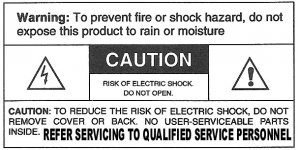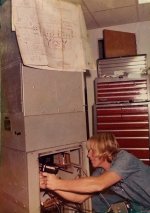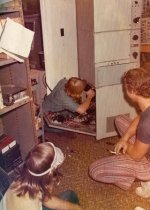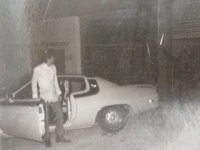If you're talking about the freebee, yes it was, but better for me. 2000$ system I sold him.
Both that and the $70 repair were good deals.
Last edited:
What would you have charged for such a repair? Some people here think I should have charged 90+$/hour and padded the parts cost. I used his parts order to get my own parts with free shipping 🙂
Technically, it was 2 transistors in a current mirror, but I replaced the electros in the audio path with new audio caps for him too. Why pay twice if it's already opened up? The parts were 20$. I charged 2 hours labour @ 25$/hour.
I'm also all about customer service though. If someone came in with an "unworking" amp and all it needed was a main fuse, I'd probably comp it. I believe if you treat people right, they will remember. I wouldn't have sold that pre/power combo if I hadn't sprayed his pots -- he wouldn't have met me.
Technically, it was 2 transistors in a current mirror, but I replaced the electros in the audio path with new audio caps for him too. Why pay twice if it's already opened up? The parts were 20$. I charged 2 hours labour @ 25$/hour.
I'm also all about customer service though. If someone came in with an "unworking" amp and all it needed was a main fuse, I'd probably comp it. I believe if you treat people right, they will remember. I wouldn't have sold that pre/power combo if I hadn't sprayed his pots -- he wouldn't have met me.
Last edited:
The local customers that you have now have come to expect certain prices. But in medium to large cities
in the USA, the rate would be more like $100 for the first hour, maybe less for additional time.
The parts cost would be doubled for resale. Remember ordering, stocking, testing, matching, etc.
all take time too.
In the USA, self employment has more IRS tax due, and more tax forms. See our schedules C and SE.
Same thing for each state. At some point, you'll get fed up and have to hire a CPA, which is a good idea.
And don't forget about local zoning laws.
https://www.irs.gov/pub/irs-pdf/f1040sc.pdf
https://www.irs.gov/pub/irs-pdf/f1040sse.pdf
If you had to rely on your price structure and income to live, you couldn't. You might want to consider
gradually raising your prices each year to adjust them to a more realistic level. It's a choice between
a subsidized hobby and a business. But I don't know much about business in Canada.
I do agree about the freebies, a few sprays is fine. The fuse is a bit more dubious, since it could have blown
for a good reason. Just make it clear up front what you will (and will not) do for free, and what could happen
if that fuse is replaced, or if that 40 year old amp that was in storage for years is plugged in.
in the USA, the rate would be more like $100 for the first hour, maybe less for additional time.
The parts cost would be doubled for resale. Remember ordering, stocking, testing, matching, etc.
all take time too.
In the USA, self employment has more IRS tax due, and more tax forms. See our schedules C and SE.
Same thing for each state. At some point, you'll get fed up and have to hire a CPA, which is a good idea.
And don't forget about local zoning laws.
https://www.irs.gov/pub/irs-pdf/f1040sc.pdf
https://www.irs.gov/pub/irs-pdf/f1040sse.pdf
If you had to rely on your price structure and income to live, you couldn't. You might want to consider
gradually raising your prices each year to adjust them to a more realistic level. It's a choice between
a subsidized hobby and a business. But I don't know much about business in Canada.
I do agree about the freebies, a few sprays is fine. The fuse is a bit more dubious, since it could have blown
for a good reason. Just make it clear up front what you will (and will not) do for free, and what could happen
if that fuse is replaced, or if that 40 year old amp that was in storage for years is plugged in.
Last edited:
Wow! 100$USD an hour...
My auto mechanic charges 95$ an hour and that's CAD! I guess that's not that far off... BMW charges 179$ an hour... They give 2 year parts and labour though.
I guess I'm living in the 90's.
My auto mechanic charges 95$ an hour and that's CAD! I guess that's not that far off... BMW charges 179$ an hour... They give 2 year parts and labour though.
I guess I'm living in the 90's.
Maybe in the 70s.
Check into consultants' fees, or for lawyers. But with different prices comes different customers.
That's just the way it works. If you are in or near a large city, there should be customers,
especially for custom work. Or you could have two parallel businesses with differing price structures.
Like you have now, and also custom in-home installations. That is big now. Think interior decorators,
they charge a fee for time, and mark up the purchased furniture as well, or get a cut from the store.
Check into consultants' fees, or for lawyers. But with different prices comes different customers.
That's just the way it works. If you are in or near a large city, there should be customers,
especially for custom work. Or you could have two parallel businesses with differing price structures.
Like you have now, and also custom in-home installations. That is big now. Think interior decorators,
they charge a fee for time, and mark up the purchased furniture as well, or get a cut from the store.
Last edited:
It's true. From my prospective, the "No User Serviceable Parts Inside -- Refer Servicing to Qualified Personnel" was always horseshit.
You must have looked at my Avatar on here huh? LOL!
<-------------------------------------
It was implimented on products for the consumer's protection and liability issues, which certainly arn't horsecrap.
Attachments
Wow! 100$USD an hour...
My auto mechanic charges 95$ an hour and that's CAD! I guess that's not that far off... BMW charges 179$ an hour... They give 2 year parts and labour though.
I guess I'm living in the 90's.
My bench fees and services were not fixed, in reality they depended on the situation.
I find that a reasonable, sensible, way to stay in business.
We'd call it "the aggravation factor" in a joking way.
A complex product, like say, a Marantz Quad receiver, would cost more than a simple amp.
Disassembly, troubleshooting time, parts costs, all factor into things.
Same with TV sets that came in - a 13" little CRT compared to a 50" flat screen.
The non-refundable up-front counter fee would be $25....... or $75.
This offsetted things if the customer turned down the estimate and abandoned the set - plus it helped to insure the customer would make the right choice in our favor.
We call it azzhole tax here. Every trade has its version. I give honest people a break.
More complicated repairs simply take more hours and that compensates for the time. Perhaps the deadliest receivers to work on are those darned Marantz 4270, 4300 and 4400 sets. These days I am thinking of refusing them all together. You simply can't get into them and the diagrams are not very good either. Just by cleaning the tone controls you can lose a channel (not a broken wire), spend 4 hours on it and still not find the problem. They were great sets for quads, but always a nightmare to work on. Try changing a speaker relay some time.
I'm at $80 an hour and in a while will go to $100 an hour. We have not kept pace with every other industry and its time we get paid something more fair. You can thank the distributors for keeping labour rates down (their shop rates), then when it became clear they couldn't afford to do the work, they bailed on the country.
Right to repair is a joke. Parts we need are being discontinued at an accelerated rate. It's time was 10 years ago and now it is too little, too late. They should absolutely be forced to make schematics and full service information available no matter what. Realistically I think the service industry is dead. We just don't know it yet.
More complicated repairs simply take more hours and that compensates for the time. Perhaps the deadliest receivers to work on are those darned Marantz 4270, 4300 and 4400 sets. These days I am thinking of refusing them all together. You simply can't get into them and the diagrams are not very good either. Just by cleaning the tone controls you can lose a channel (not a broken wire), spend 4 hours on it and still not find the problem. They were great sets for quads, but always a nightmare to work on. Try changing a speaker relay some time.
I'm at $80 an hour and in a while will go to $100 an hour. We have not kept pace with every other industry and its time we get paid something more fair. You can thank the distributors for keeping labour rates down (their shop rates), then when it became clear they couldn't afford to do the work, they bailed on the country.
Right to repair is a joke. Parts we need are being discontinued at an accelerated rate. It's time was 10 years ago and now it is too little, too late. They should absolutely be forced to make schematics and full service information available no matter what. Realistically I think the service industry is dead. We just don't know it yet.
We call it azzhole tax here. Every trade has its version. I give honest people a break.
I'm at $80 an hour and in a while will go to $100 an hour. We have not kept pace with every other industry and its time we get paid something more fair. You can thank the distributors for keeping labour rates down (their shop rates), then when it became clear they couldn't afford to do the work, they bailed on the country.
Right to repair is a joke. Parts we need are being discontinued at an accelerated rate. It's time was 10 years ago and now it is too little, too late. They should absolutely be forced to make schematics and full service information available no matter what. Realistically I think the service industry is dead. We just don't know it yet.
This another reason that I decided to distance myself from regular servicing, and basically retire.
I saw the light at the end of the tunnel for us guys.
Luckily, I brought home a good part of the stock we had when we closed/sold the building in 2016.
So I have enough to "keep me going", and still have accounts with my suppliers (mouser, newark, etc. etc.)
I enjoy just the "occasional" job now.
But my plan now is to take it easy and enjoy life.
Wow! 100$USD an hour...I guess I'm living in the 90's.
Maybe in the 70s.
I ran the service department of the largest Olson Electronics store in the US in 1971 and 1972. We charged $8.95 for the first hour plus parts (usually at the list price if from store stock). I got paid half of the labor charge. There wasn't much in the way of Olson branded stuff that I couldn't fix in an hour. I reserved Friday for tape deck (8 track) day, mostly Craig Pioneers. I had a special bench with a power supply, speakers, and a monster cable with every plug known to man on it. I could fix 4 or 5 in an hour, just line them up, rip the covers off and change the output transistors associated with the fried emitter resistors.
A wise man once said that 90% of your problems come from 10% of whatever. In retail repair the 10% are the azzholes. Almost all of them were University of Miami students, the kind that are taking a 4 (or more) year vacation on Daddy's money and may or may not actually go to classes. No, the warranty does not cover beer ingestion or an attempt to connect 27 speakers up at the same time.
I left retail repair for good on the first work day of 1973 to begin my 41 year career at Motorola. I still fixed stuff for my friends, friends of friends, and even some people I met at Ace Music or the local stereo store (both had crap technicians). I charged anything from nothing at all, to about $25 per hour, depending..... This was the 70's through the late 80's.
When Smokey chased the Bandit around the movie screen (1976 maybe) I drove 50 miles every Sunday morning to a CB radio shop to fix dead CB sets for $10 each, cash. I got there early in the morning, and left when I had emptied the store's cash register.
There were often some "special" jobs. How much to get a 3000 watt Gates shortwave broadcast transmitter up and running? Put a 1 KW Collins linear amp in the back seat of a Road Runner? I don't remember, but it was a bunch.
Attachments
Reminds me of my ex wife. Right after we were married in 1979, I decided to rebuild my carburetor on my 1973 El Camino. Soak them in cleaning solution (don't know what it was, but I learned not to pull the parts out with my bare hands). Spread newspaper on the kitchen table, rinsed the parts and let them dry on the newspaper after blowing them off with compressed air. She looks at all the parts and asks me if I was going to be able to put it all back together. An hour later, we're driving down the road and I look at her and ask her if she thought I would be able to put the carburator back together?
Way back in the 80s my Cadillac was apart at my buddy's house. The car was in the driveway and the parts were on a shelf in the garage. The cylinder heads had just come back from the machine shop and we were going to spend Saturday reassembling the engine.
My buddy's uncle stopped by right when we started. He looked under the hood and said "This car will not leave this driveway on its own power." At 1:00 Sunday afternoon I drove the car home and parked it in front of my house.
My buddy's uncle stopped by right when we started. He looked under the hood and said "This car will not leave this driveway on its own power." At 1:00 Sunday afternoon I drove the car home and parked it in front of my house.
🙂Right to repair is a joke. Parts we need are being discontinued at an accelerated rate. It's time was 10 years ago and now it is too little, too late. They should absolutely be forced to make schematics and full service information available no matter what. Realistically I think the service industry is dead. We just don't know it yet.
When they implemented a tax on disposal at the time of sale for electronics, that was "the writing on the wall", for the government's support for our throw it away society.
A $80-100/hr service rate and the cost to buy new becomes equal, we know which choice a cheap consumer makes.
What gets me is the chip shortages are partly to blame on the auto mfg's, why do we need all this electronics in a car?, for the passengers?, crap I thought looking out the window, seeing the world, live eye, was enough entertainment for me. For the driver, electronics only offer, pure distraction from what you are to be focusing on, driving the damn car safely.
Enough for today's rant 🙂
The electronics started out as powertrain management, which opened the door for more efficient and cleaner running cars. They run a lot better too and they always start no matter how cold it is outside. Who remembers pumping the gas pedal or holding the choke open with a screwdriver shoved in the carburetor on a flooded engine?  Does anybody miss that?
Does anybody miss that?
But then it morphed into infotainment systems (salesman's tip: DON'T say that fake word when trying to sell me a car 😉 ) and now there's such an excess of electronics that it's ridiculous.
Present economic models depend on consumers buying more and more and more crap. If everybody drove a car 20 years like me, then the US of A economy would suffer.
When is an auto manufacturer going to offer a high quality, basic vehicle (4 cylinder 5 speed manual) that won't infotain me but will get me where I'm going efficiently and safely? Last I checked only Subaru offered a vehicle with a manual transmission (a 6 speed to be precise), and it was priced at $26K. Not bad, but how about ripping out some of that crap I'll never use and sell it for $15K? Hello China!
And the icing on the cake is that these vehicles are considered to be disposable. That is the ultimate insult to the environment. Yeah recycle, but recycling is nasty to the environment. How about building something that provides 30+ years of reliable service, with the same materials, and skip the fluff? A new car costs more than my first house and almost as much as my second - and those houses still have families living in them.
 Does anybody miss that?
Does anybody miss that?But then it morphed into infotainment systems (salesman's tip: DON'T say that fake word when trying to sell me a car 😉 ) and now there's such an excess of electronics that it's ridiculous.
Present economic models depend on consumers buying more and more and more crap. If everybody drove a car 20 years like me, then the US of A economy would suffer.
When is an auto manufacturer going to offer a high quality, basic vehicle (4 cylinder 5 speed manual) that won't infotain me but will get me where I'm going efficiently and safely? Last I checked only Subaru offered a vehicle with a manual transmission (a 6 speed to be precise), and it was priced at $26K. Not bad, but how about ripping out some of that crap I'll never use and sell it for $15K? Hello China!
And the icing on the cake is that these vehicles are considered to be disposable. That is the ultimate insult to the environment. Yeah recycle, but recycling is nasty to the environment. How about building something that provides 30+ years of reliable service, with the same materials, and skip the fluff? A new car costs more than my first house and almost as much as my second - and those houses still have families living in them.
Also electronics is ubiquitous today. I had to fix my washing machine and there's an electronic board in there controlling everything. There's even a diagnostic function just like the older computer controlled vehicles had. You insert a jumper wire in an empty fuse holder and it goes into diagnostic mode, flashing an on board LED with codes.
I'm with Fast Eddie D on those last two posts.
Cars have become rediculous machines with confusing and way over-done technology.
Same with domestic appliances.
This then allows justification and all the jacked-up prices for that technology.
I loved my old 1972 Chevy Nova, 68 Mustang, 69 Chevelle, and only paying $30 for a starter which I could put in myself.
Now?... ya got a rolling computer commutor on wheels that allows you to be a mindless idiot due to auto-parking, auto lane warnings, auto everything, including auto-driving.
But you'll pay in the end for sky-high service that you can't think about doing.
And I stil love my old Kitchenaid dishwasher and Maytag washer with a plain old rotary knob timer instead of some crappy electronic controls.
Those machines will outlast me!
Cars have become rediculous machines with confusing and way over-done technology.
Same with domestic appliances.
This then allows justification and all the jacked-up prices for that technology.
I loved my old 1972 Chevy Nova, 68 Mustang, 69 Chevelle, and only paying $30 for a starter which I could put in myself.
Now?... ya got a rolling computer commutor on wheels that allows you to be a mindless idiot due to auto-parking, auto lane warnings, auto everything, including auto-driving.
But you'll pay in the end for sky-high service that you can't think about doing.
And I stil love my old Kitchenaid dishwasher and Maytag washer with a plain old rotary knob timer instead of some crappy electronic controls.
Those machines will outlast me!
- Home
- Member Areas
- The Lounge
- What did you last repair?




